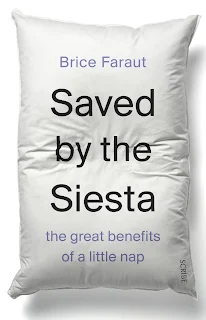* Copy courtesy of Scribe Publications *
I'm fascinated by the topic of sleep and never tire of talking about sleep, sleep habits, dreams and the science of sleep. Saved by the Siesta - The Great Benefits of a Little Nap by Brice Faraut and translated by Eric Rosencrantz is a compact read and promises to be an 'expert guide on the art and science of napping', something I haven't explored before.
Faraut is a neuroscientist and spends much of the book establishing the benefits of night time sleep in order to highlight the problems when a patient doesn't attain a full night's rest; or worse, begins to accrue a sleep debt. He also outlines the different sleep needs we have from the cradle to the grave, so the reader's age will be a factor to consider when reading this book.
I enjoyed the reminder about the nasal cycle (learned when reading Breath - The New Science of a Lost Art by James Nestor):
"One such clock controls the alternation of our nasal cycle and, much to the detriment of the quality of our sleep and for reasons long unknown to us, makes us roll over every 60-90 minutes from one side of our bodies to the other, namely the side with the currently congested nostril." Page 16I had a head cold this week, and it's these periods when we become more aware of the nasal cycle. I've read before that during sleep our brains cleanse toxic substances away, however I didn't know that
"the space between our billions of brain cells increases by 60 per cent during sleep." Page 43 Apparently our brain is contracted and curled in upon itself when at full capacity, but when we sleep it relaxes and dilates to its full volume, enabling the cerebrospinal fluid to drain the toxic metabolites away from the brain twice as fast. No wonder we can feel groggy when we wake up or stumble to the bathroom in the middle of the night.
The section describing how a lack of sleep causes increased sensitivity to pain rang true for me as someone with a chronic pain condition. The less sleep or rest I have, the worse the pain levels. The author acknowledges that those with chronic pain find it harder to sleep in the first place, which in turn makes their pain more difficult to endure, creating sleep debt and reinforcing a negative spiral. That's where naps come in. According to the author:
"Napping might also turn out to be useful in relieving pain caused by fibromyalgia." Page 132While this wasn't news to me, it may be enlightening and helpful to readers new to the topic.
The author provides a brief overview of many sleep studies conducted around the world, some of which he was involved in, however much of the content will be too scientific for many readers. Faraut points out the numerous ways in which not getting enough sleep - or working night shift - takes its toll on the body in terms of reaction times, memory, mood and general health to the longer term effects and even cancer.
Faraut then goes on to recommend different nap durations at different times of day that will directly address a patient's concern, e.g. to improve memory performance, have a long nap with 'deep stage-three slow wave sleep to eliminate parasitic information and REM sleep.' However given the variables already presented, the reader almost needs a slide rule, calculator and health questionnaire to figure out precisely how to apply the advice to their unique set of circumstances. When I take a nap, I'm usually recovering or recuperating, not preparing for something, but how normal is this? What about you? Do you nap in advance?
I was interested to learn about the 'correct body positions' for napping but lying on your back or sitting at a reclined angle was deemed best, without mention of side or stomach sleeping which was disappointing. The 'ideal time of day' to nap varies greatly on your existing sleep habits, health status, work practices, sleep patterns and circadian clock. If I am older and rise later than you, then the best time for each of us to take a nap will vary. See what I mean about the slide rule?
I agree with the author in his conclusion that it's more important to get a proper night's sleep in the first place, but as we know, life isn't perfect. I also agree with the author that:
"We need to change our view of sleep and put paid to the misconception that sleeping's a waste of time, opportunities, and money." Page 141More and more patients experiencing sleep problems and insomnia are glued to their devices, too razzed up to sleep and with a FOMO preventing them from disconnecting or being able to relax and let it all go. I'm a strong proponent of the curative and healing benefits of sleep and appreciate the benefits of a nap first hand. It's often my preferred method of recovery however I wasn't able to learn anything new here to supplement previous reading.
I'll leave you with some closing words from the author:
"What is certain, on the other hand, is that taking a nap every day to offset our sleep debt is a natural and beneficial medication. From morning to mid-afternoon, the variety of possible nap durations, from 10-90 minutes, depending on our availability, age, and needs, makes it a judicious and formidable weapon for reinforcing not only our metabolic, hormonal, immune, somesthetic, and cardiovascular functions, but also our alertness, cognitive performance, memory, mood, empathy, and creativity." Page 144Saved by the Siesta - The Great Benefits of a Little Nap by Brice Faraut is recommended for readers new to the science of sleep looking to unlock one of the body's most basic yet crucial functions.



































